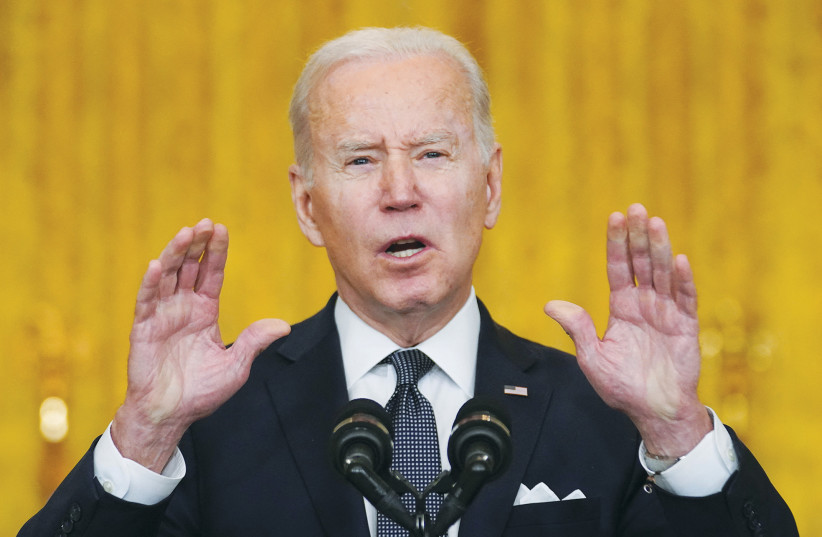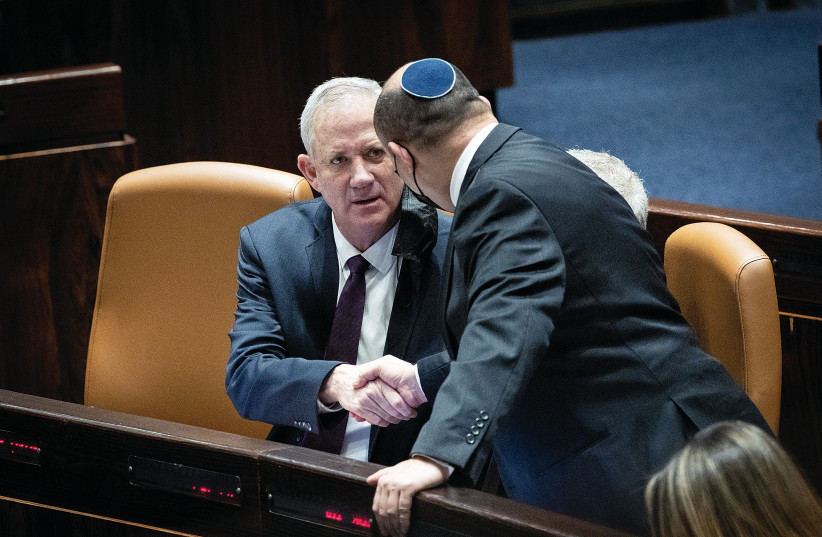I heard an analysis a number of years ago by one of Israel’s top intelligence officials, who spoke about the four pillars from which the Jewish state derives its military and diplomatic power.
The first pillar, the former official said, is Israel’s purported nuclear program. The country does not admit that it has nuclear weapons, but neither does it deny it. Everyone thinks Israel does, believes Israel does, and that perception creates deterrence.
The second pillar is the country’s conventional military, otherwise known as the IDF. It is sophisticated and technologically advanced, and far superior in tactics, weapons and ethics in comparison with other militaries across the Middle East.
The third pillar is the country’s technology. It is what everyone wants. Part of what helped bring about the Abraham Accords in the summer of 2020 was exactly that: a desire by countries who were once our adversaries to tap into the Israeli ecosystem of innovation, creativity and advancement.
The fourth and final pillar is Israel’s unique alliance with the United States. It is a relationship exemplified not just by the supply of advanced military platforms, foreign aid, or the vetoing of an anti-Israel resolution at the UN Security Council, but through a history of shared values, morals and culture.

What this fourth pillar means is that when America is strong, Israel is strong, and when America is perceived as being weak, Israel is perceived as being weak. Israel’s enemies know it, and constantly search for that vulnerability.
And this is the problem for Israel when it considers the Russian invasion of Ukraine.
There are other problems as well, including perhaps the biggest: being able to continue operating freely in Syria against Iranian entrenchment, or if Russia – in control of Syria – will now prohibit Israel from continuing its almost weekly forays across the border.
What will the situation in Ukraine do to the nuclear talks in Vienna with Iran? Will the world have the bandwidth to continue to finish negotiating a new (better?) nuclear deal, or will it just want to get it out of the way and conclude an agreement even worse than might have originally been possible?
What really has Israel concerned this week is that America – a country once perceived to be the moral and military policeman of the world – is no longer respected.
The signs were already there for years. Iran was not bending to American demands, and its proxies – in Lebanon, Iraq or Yemen – were acting in the Middle East with complete abandon, without fear of retribution. When the UAE, Bahrain and Morocco decided to normalize relations with Israel, they understood that if there is one country actually standing up to Iran on an almost daily basis, it isn’t the United States. It’s Israel.
The refusal to force Iran to concede during the new round of talks in Vienna, and to agree to a shorter and weaker deal despite promises of a stronger and longer deal, was yet another illustration of the decline of American power. So was the hasty and negligent withdrawal from Afghanistan this past summer done without regard to regional consequences.
Even the rhetoric heard in recent weeks in American TV studios about who is stronger – Vladimir Putin or Joe Biden – is itself problematic, and shows just how rotten American political culture has become.
And now there is Ukraine, and Russia’s decision to invade without worrying about what the US and its president have warned against.
What this means for the future of world order is yet to be seen. What this means for the future of Europe and the standing of NATO or the European Union will also take time to understand.
But what it says for Israel – almost immediately – is that the fourth pillar is not as strong as it once was perceived. That is concerning – even frightening – in a region as volatile as the Middle East.
* * *
I was surprised to discover on Sunday that I was no longer a citizen of the “State of Israel” but rather the “entity of Israel,” as per the message from Defense Minister Benny Gantz in his speech at the Munich Security Conference last weekend.
“Eventually we will find ourselves in a two-entity solution, in which we respect Palestinian sovereignty and governance, but we will be respected for our security needs,” he said at the international gathering.
When pushed on the choice of the word “entities,” as opposed to “states,” Gantz said that the word “state” creates an illusion, making it seem as if it is still possible to return to pre-1967 borders.
It was odd to hear Gantz speak this way. He is supposed to be the person in the coalition who represents the center-left. He has met twice recently with Palestinian Authority President Mahmoud Abbas, once in Ramallah and once at his home in Rosh Ha’ayin. If there was anyone in the government who best represents the standard Israeli position of “two states” when it comes to Palestinians, it was supposed to be Gantz.
What Israelis learned on Sunday was that the political situation in Israel has also gotten to Gantz; and that what the former chief of staff has learned in his three years in politics is that ideology is fluid, and doesn’t really mean much to the average voter. He seems to be assuming that it is better to play for the right-wing, either to cozy up to the Likud – which some in Prime Minister Naftali Bennett’s circle think Gantz is eyeing for a future government – or at the least to break away from the center-left.

Gantz knows that most Israelis don’t think or care about the Palestinians. Occasionally – during a flare-up in Gaza, or after some international condemnation – they are reminded that there is still an unsettled conflict in Judea and Samaria, but for the most part, they prefer to be left alone. Gantz, it seems, wants to be part of that group.
But beyond that, the problem with what he said goes far deeper. On the eve of its 74th birthday, Israel has yet still to decide what it is that it wants with the conflict. There are governments that talk about two states, governments that talk about one state, prime ministers who talk about autonomies on steroids, and now, apparently, a defense minister who talks about entities.
This hesitancy and indecisiveness do not do Israel any favors. Israel has to decide what it wants. It won’t be able to achieve what it desires – the Palestinians have repeatedly shown that Israel’s maximum offer does not meet their minimum offer – but there is value in creating an understanding internally of a vision for what Israel wants to see happen. Instead, Israeli political leaders play semantics.
While polls show a declining level of support for two states, it still remains the most popular solution among Israelis. One poll in August showed that 40% of Israelis support the model – a significant drop from the 70% who supported it in 2007 – but still the proposal that receives the most support.
That is likely due to an Israeli desire to disengage and separate from the Palestinians – if they are ever forced to think about them. Games of semantics, like the one Gantz played in Munich, matter less. They want solutions, not politics.
The bigger problem is that if Israel can’t figure out what it wants, how can we ever expect there to be real progress? The sad reality is that for the last 30 years, we have constantly watched as various American and European governments have rolled out their own plans that Israeli governments either fought, or fell in line behind. There was the Oslo process, the Clinton Parameters, the Bush Road Map, the Kerry Plan and most recently the Trump Peace to Prosperity plan.
What is amusing is that all of these plans – all adopted by Israeli governments – were based on the model of the “two-state solution.” Has Israel come up with something different? No. It just calls it something different – entities, autonomies – over fear of political retribution. The result would be the same. It is just the name that our politicians keep changing.
Don’t misunderstand me. I do not think that the Palestinians are ready to manage their own state right now, nor are they prepared to make the concessions needed for a deal to even be possible. If Israel was serious though, it would at least have discussions about what it is that it wants. That should not be too much to ask.
***
Have you watched the new TV show The Refaelis, an Israeli version of Keeping Up with the Kardashians? It’s about the scandal-ridden family of Israeli supermodel Bar Refaeli, who, together with her mother, Tzipi, were convicted in 2020 of tax offenses. Tzipi took the hit for Bar and sat for eight months in jail. Her more famous daughter paid a fine and did some community service.
Did you watch the two episodes of Masterchef VIP, the hit reality cooking competition TV show? The winner was Likud MK Dudi Amsalem. Yes, the same Amsalem known for his vile political rhetoric, for whom no low is ever low enough when speaking to political adversaries.

And what about the Tinder Swindler, the hot new documentary on Netflix that would just about make any Israeli mother proud if it was her son who – like Shimon Hayut – pretended to be a billionaire playboy so he could get his hands on his Tinder matches’ money.
These are three hot new shows in Israel – and it makes me wonder why. I have not watched them except for trailers, but those are enough to make me wonder if these hit shows in Israel in the year 2022 don’t say something about our society and what has become of it.
Bar Refeali and her mother are convicted criminals; Dudi Amsalem has set for himself a goal to foster division between Ashkenazim and Sephardim, to drive an even greater wedge within an already polarized society; and Hayut, an alleged con artist. None of these celebrities is a role model that parents should want for their children.
These people have become popular heroes. They receive media coverage, appear on the cover of magazines, and automatically gain public sympathy and respect. Former judge Eti Karif – who celebrated her extramarital affairs on TV after losing her seat on the bench following a police investigation – is now a regular fixture at celebrity events, and, my lord, there is even talk of a future political career in the cards.
This is beyond a sad state of affairs, one which reflects so poorly on our country. There is a lot to be proud of in Israel, with untold numbers of citizens who can serve as the role models we should want for our future generations. We should do better.
